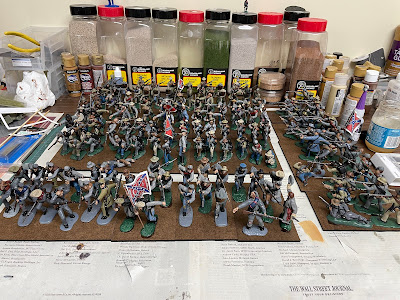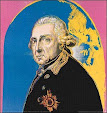 |
North Carolina regiment of Confederates from Scales' Brigade.
Note the conversion of the figure on the left into a flag bearer on the right.
Figures from CTS (Classic Toy Soldiers) |
I want to provide a brief update on my 54mm Pickett's Charge Project for Historicon 2024. As of the end of October 31, 2023 I have painted 8 Union regiments and 11 Confederate regiments. At 30 figures per regiment that is a total of 570 figures painted since August 1, 2023 and an average of 190 figures painted per month.
Brigade Organization for the game
My brigades for both armies are currently organized with three regiments of 30 figures each, or 90 figures total for a brigade. The plan is to have five brigades per side plus one artillery command per side, for a total of 12 players in the game.
The size of the units at 30 figures per regiment equates to roughly 300 soldiers using a 1:10 figure to man ratio. This seems like a reasonable regimental strength for ACW regiments during the mid-war period of 1863. Some of the Confederate regiments in Heth's Division of A.P. Hill's III Corps had upwards of 500 to 600 men, largely due to the fact that they had been stationed out of the active theaters of war (guarding Richmond and North Carolina) and thus retained more of their original strength prior to the start of the Gettysburg campaign. I consider these to be outliers.
You might ask why I am only having three regiments in my brigades when in fact the brigades were likely to have four or five regiments at Gettysburg. The answer is: the unit frontage takes up a lot of space on the game table. Each five stand regiment of figures has a frontage of approximately 15-inches. Allowing for some space between the regiments when they are deployed in a regimental line (all 3 regiments deployed in one battle line), I need a table frontage of about 48-inches (or four feet). Assuming the need for a minimum of 12-inches between brigades for spacing purposes, let's assign an extra foot or 12-inches to each brigade frontage. Now we are looking at five feet of frontage for each brigade or 15 feet of tabletop space to deploy Pickett's Division of three brigades.
 |
Armistead's Brigade deployed with a brigade frontage of two regiments
and a supporting third regiment forming a second line. |
Now assuming that the good folks at Historicon would allow me to have a table that is 20 feet in length, the entire division with a brigade frontage would take up 15 feet and have 2-1/2 feet of open space on the flanks. That is fairly tight. It also only allows for three brigades or three players on the Confederate side and maybe a fourth command if one player commands all of the artillery in each army. I need 5 to 6 commands per side.
Alternative Tabletop Plan
An alternate idea is to deploy each brigade in a two regiment frontage (30-inches plus 6-inches of space between the regiments, or 36-inches of frontage ) with the third regiment deployed behind the front two regiments. This reduces the brigade frontage by 12-inches (one foot). Now I can potentially add a fourth brigade to the Confederate battle line which now takes up 12 feet of frontage on the table. Let's add another foot per brigade for spacing (or 4 more feet) which brings the Confederate battle line to 16 feet of total tabletop space. This allows for 2 more feet of open space on each flank to use up the entire 20 feet length of the table surface.
Were I to scoot the Confederate right flank to the righthand edge of the table, that gains an additional two feet that could increase the left flank open are from two feet to four feet. I could compensate for the lack of flank space on the right hand side of the Confederate line by allowing off table firing from the Union side. This would simulate the flanking fire that Kemper's brigade was taking on the right flank of Pickett's division during the assault on Cemetery Ridge.
Still Missing a Sixth Confederate Command
The scheme outlined above allows for four Confederate brigade players plus a fifth player commanding all of the Confederate artillery (Porter Alexander). I still need one more player command in the game. After scratching my head for awhile and humming a few bars of "When Johny Comes Marching Home Again" I hit on the idea of deploying a second battle line behind Pickett's division that provides support to the main attack. This would represent elements of Scales' brigade and/or Pettygrew's Division. This might work.
So now I am envisioning Pickett's Division deployed on the table with 12 feet of frontage on a 20 foot long table. Then Pettygrew's Division of three brigades would be deployed "en echelon" slightly behind Pickett's Division. This results in 6 infantry brigades plus an artillery brigade for a total of seven Confederate player commands!
What About the Union Player Commands?
I would have to run through the similar calculations for the Union army player commands, but without going through the math in my head (I hate it when that happens) I envision five Union brigades with each brigade commander having a battery of artillery attached to his/her brigade. So 7 Confederate plus 5 Union player commands gets us to 12 player commands in the game. Perfect.
Basing All of these figure stands
After painting all of these figures, now comes the hard part of putting them on bases and organizing them into regiments. As of October 31st I have based 5 Confederate and 1 Union regiment(s) out of 11 regiments, so I have some serious work to do! I will have to take a break from my painting and pitch into the task of basing what I have so as to not let the backlog of units and figures pile up. If I were to wait much longer I would be faced with the tedious task of basing way too many figures. It can be very daunting.
Here are some of the unbased Confederate regiments that are on my work bench:

|
Confederate regiments from Kemper's Brigade awaiting the application of ground terrain.|
| Armistead's Brigade at Gettysburg as organized for my Pickett's Charge game. |
|
 |
| Ground level view of one of the Confederate regiments. |
What's Next?So after basing the remaining 7 Union and 5 Confederate regiments, then I will go back to painting Union regiments. I want to increase the Union army from 8 regiments to 12 regiments. That will give me 12 regiments per side all ready to go and play on the tabletop. That means that I have 3 to 6 regiments per side that I need to paint going forward after the Union side reaches 12 regiments.
I am well ahead of schedule in terms of my painting so I might take a little break and start working on some of the terrain that I will need for the game. I'm looking at about 36 feet of post and rail turnpike fencing to cover the 18 foot long Emmitsburg Road in my game. Yikes!









